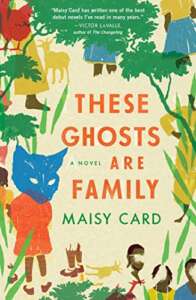 Discussion questions for These Ghosts Are Family by Maisy Card
Discussion questions for These Ghosts Are Family by Maisy Card
- What do you think the title of the book refers to? Who are the ghosts?
- Parts of this book are written in a Jamaican dialect. Did that add to your experience, or detract from it? Did you listen to the book? What did you think about the dialect in the audiobook?
- The last chapter was a departure from the tone of the rest of the book? Why do you think the author chose to end the book in this way? What was the message of the last chapter? The Atlantic’s reviewer writes that the three girls “force a whole town to remember the harms they suffered while alive.” What do you think of that explanation?
- In an interview, Card says she wanted to convey a message of hope and survival, that “our ancestors have gotten through worse, and even with the baggage we’re born with and the baggage we acquire, we can thrive and make life a little bit easier for someone else.” Does she succeed? Do you feel like life improved for successive generations of the family?
- Several chapters (Estelle’s Black Eye, Gratitude, The True Death of Abel Paisley, and Past Lives) were published individually before they were published together as part of a novel? How do those chapters stand on their own? How do these chapters fit in with the rest of the book?
- Chapters in the book take place in a variety of settings, including New York, London, and different parts of Jamaica. Did any of these settings come alive for you more than others?
- Several reviews, including this one from The Atlantic, assert that there’s “a direct line from Harold to the trauma that now shapes Abel’s family”. Do you see that line? Can you describe specific ways in which the Paisley/Fowler family legacy haunts their descendants into the 21st century? The Atlantic’s reviewer suggests that, “[Abel’s] haunting is … insidious, palpable in the two centuries of lives destroyed, familial connections ruptured, and economic stability stolen.” Does that answer the question of why he took his friend’s identity?
- Why do you think Debbie destroyed Harold’s journal?
- Card describes this book as a “novel in stories”. Does thinking of each chapter as an individual story change your understanding of the book in any way?
- Are there any chapters that you would have liked to see fleshed out into a whole book?
- Card chose not to write the chapters in a linear fashion, but instead to mix modern chapters with historic chapters.
- Why do you think she chose to do this?
- Would your understanding of the story have been different if she’d started at the beginning, so to speak, and gone through the generations chronologically?
- Why do you think she chose to start where she did?
For more questions, check out the publisher’s resources.

